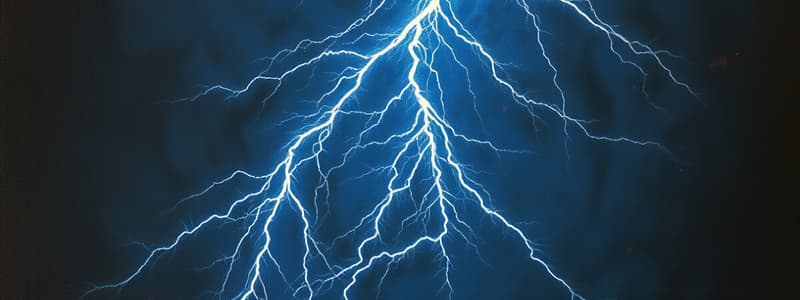Podcast
Questions and Answers
What causes static electricity?
What causes static electricity?
- An imbalance of electrons and protons, leading to excess charge. (correct)
- The movement of electrons within a conductor.
- The friction between two electrically charged materials.
- An increase in temperature affecting charge distribution.
Which statement accurately describes a positive charge?
Which statement accurately describes a positive charge?
- It is the result of equal numbers of protons and electrons.
- It occurs when an object has gained electrons.
- It occurs when an object has lost protons.
- It occurs when an object has lost electrons. (correct)
How do objects with like charges interact with each other?
How do objects with like charges interact with each other?
- They combine to form neutral charges.
- They repel each other. (correct)
- They have no effect on each other.
- They attract each other.
Which of the following materials is classified as an insulator?
Which of the following materials is classified as an insulator?
In which application is static electricity NOT commonly used?
In which application is static electricity NOT commonly used?
Flashcards are hidden until you start studying
Study Notes
Definition of Static Electricity
- Concept: Static electricity is the accumulation of electric charge on the surface of objects.
- Cause: Results from an imbalance of electrons and protons, leading to excess positive or negative charge.
- Charge Types:
- Positive Charge: Occurs when an object has lost electrons.
- Negative Charge: Occurs when an object has gained electrons.
- Common Phenomena:
- Hair standing on end when combed.
- Lightning discharges during storms.
- Shock felt when touching a metal object after walking on a carpet.
- Key Principle: Objects with opposite charges attract, while like charges repel each other.
- Insulators vs. Conductors:
- Insulators: Materials that do not allow electrons to flow freely (e.g., rubber, glass).
- Conductors: Materials that allow electrons to move easily (e.g., metals like copper, aluminum).
- Applications: Used in photocopiers, electrostatic painting, and various electronic devices.
Definition of Static Electricity
- Static electricity refers to the accumulation of electric charge on the surface of objects.
- Imbalance between electrons (negative charge) and protons (positive charge) causes static electricity, resulting in excess positive or negative charge.
Charge Types
- Positive Charge: Occurs when an object loses electrons, leading to an overall positive charge.
- Negative Charge: Results from an object gaining electrons, resulting in a net negative charge.
Common Phenomena
- Hair can stand on end after being combed due to the accumulation of static electricity.
- Lightning discharges during storms are a dramatic display of static electricity in nature.
- A shock is experienced when touching a metal object after walking on a carpet, due to built-up charge being released.
Key Principle
- Objects with opposite charges are attracted to each other, while like charges will repel one another, illustrating fundamental electrostatic interactions.
Insulators vs. Conductors
- Insulators: Materials such as rubber and glass that do not permit free flow of electrons.
- Conductors: Materials like copper and aluminum that allow electrons to move easily, facilitating the transfer of electric charge.
Applications
- Static electricity plays a role in technologies such as photocopiers, electrostatic painting, and various electronic devices, demonstrating its utility in everyday applications.
Studying That Suits You
Use AI to generate personalized quizzes and flashcards to suit your learning preferences.



